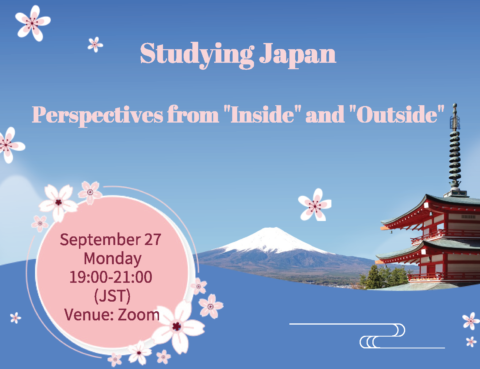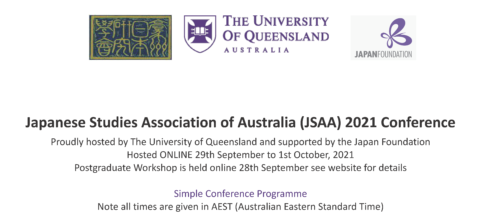Veranstaltungen und Aktivitäten
Workshop on International/Global Japanese Studies
 The study of Japanese culture, the Japanese economy, and Japanese society by foreign scholars can be traced back as far as the Edo period. However, it was not until the early 21st century that such external perspectives began to attract significant academic attention and public interest inside Japan. Research institutes, faculties, and departments named “International Japanese Studies” or “Global Japanese Studies” have gradually emerged in Japanese higher education and opened up innovative areas of research. As a new field of study with an interdisciplinary and highly international nature, International/Global Japanese Studies is confronted by many challenges and uncertainties. On September 27, the DIJ, together with the Center for Japanese Studies of Fudan University (Shanghai) and the Global Japanese Studies Education and Research Incubator (GJS-ERI) of Osaka University will hold an online workshop to approach International/Global Japanese Studies from a variety of disciplinary perspectives and cultural backgrounds. Details and registration here
The study of Japanese culture, the Japanese economy, and Japanese society by foreign scholars can be traced back as far as the Edo period. However, it was not until the early 21st century that such external perspectives began to attract significant academic attention and public interest inside Japan. Research institutes, faculties, and departments named “International Japanese Studies” or “Global Japanese Studies” have gradually emerged in Japanese higher education and opened up innovative areas of research. As a new field of study with an interdisciplinary and highly international nature, International/Global Japanese Studies is confronted by many challenges and uncertainties. On September 27, the DIJ, together with the Center for Japanese Studies of Fudan University (Shanghai) and the Global Japanese Studies Education and Research Incubator (GJS-ERI) of Osaka University will hold an online workshop to approach International/Global Japanese Studies from a variety of disciplinary perspectives and cultural backgrounds. Details and registration here
Nora Kottmann presents COVID survey findings at JSAA conference

DIJ researcher Nora Kottmann will present her paper „Space, place and the pandemic: First insights into changing spatial configurations of singles’ intimate practices“ at this week’s Japanese Studies Association of Australia (JSAA) 2021 Conference. It is part of the panel „Singles and Intimate Practices in COVID times: Perspectives from an Original Survey“ which also includes presentations by her cooperation partners Laura Dales and Akiko Yoshida. The panel presents findings from the analyses of the survey data, with an aim to better understand the lives and non-familial relationship worlds of unmarried adults, and the experiences and practices from COVID-19 related changes to lifestyle and social practices. This research is part of Nora’s project COVID-19 and its effects on singles in Japan: Personal relationships and practices of intimacy in the time of ‘social distancing’ and ‘self-discipline’. The panel session takes place on Thursday, September 30th, from 11.30 am JST. Conference programme here
DIJ researchers at EAJS, EACS, and ICAS virtual conferences

Every three years, Japanese Studies experts from all over the world present their latest research at the European Association for Japanese Studies (EAJS) conference. From 24-28 August, Franz Waldenberger, Susanne Brucksch, Isaac Gagné, Sonja Ganseforth, Barbara Geilhorn, Markus Heckel, Nora Kottmann, Harald Kümmerle, Torsten Weber, and Yufei Zhou will participate in this year’s virtual EAJS conference as presenters, discussants, or chairs in the sections ‚Anthropology and Sociology‘, ‚Economy, Business and Political Economy‘, ‚Language and Linguistics‘, ‚Intellectual History and Philosophy‘, ‚Urban, Regional and Environmental Studies‘, and ‚Performing Arts‘. Programme and details here. In addition, Yufei Zhou will give a presentation on „Transoceanic Contacts in the Making of Sinological Knowledge“ at the European Association for Chinese Studies (EACS) conference on August 27 and Sonja Ganseforth will present her book publication Rethinking Locality in Japan (Routledge 2021), co-edited with DIJ alumnus Hanno Jentzsch, at the International Convention of Asia Scholars (ICAS) on August 28.
Keynote talk by Susanne Brucksch at Robotics Conference

DIJ Principal Researcher Susanne Brucksch will be one of four keynote speakers at the 17th IEEE International Conference on Advanced Robotics and its Social Impacts (ARSO 2021). In her keynote on Friday, July 9, Susanne will reflect on how the relationship between humans and devices in medical contexts can be specified when the sociocultural dimension of a particular locale is included. For instance, the study of the social context provides manifold insights on knowledge production, research and development processes, user contexts, and the institutional background of the making and application of medical devices. Examples from the research literature and case studies will illustrate these intersections. Her talk draws on her recently published co-edited volume Humans and Machines in Medical Contexts in Japan and her book chapter „Robotic Care Devices: Aktuelle Entwicklungen in der Pflegerobotik in Japan“ in Genese und Folgen der Pflegerobotik (in German).
Workshop ‚Technology & Society in Japan and Beyond‘

Technical artefacts, technologies, and infrastructures are shaping our everyday life in manifold ways. At the same time, their development, promotion and/or rejection is influenced by cultural patterns, ethical principles, social values as well as power relations. This one-day workshop of the Research Initiative ‘Technology & Society in Japan and Beyond’ brings together scholars who share an interest in the analysis of co-construction processes of technology and society in Japan and beyond. Twelve speakers will address the themes ‚User, Visions and Technology Development‘ and ‚Ethics, Health and Technology in Context‘. The workshop takes place online on June 25 and is organized by Susanne Brucksch and Cosima Wagner (FU Berlin). Details and registration here
Gender & Sexuality series lecture on women in Japanese videogames

This presentation examines the representation of women in Japanese videogames, situating the depiction of female bodies in terms of political discourse. Focusing on the online card-based wargame Kantai Collection, it analyzes how attributes of Japanese warships are reflected in the physical characteristics of women. At the same time, Kantai Collection is highly political in its theme, representation of women, and enactment of war memories. This presentation examines the game and related artefacts as part of a popular politicization of WWII by Japanese artists, also seen in the recent spate of blockbuster revisionist films, as well as Nazi imagery and narratives in anime and manga. It argues that the hyper-sexualization of women in Kantai Collection contributes to the exoticization of war as distant and unreal, in a continued context of controversial war memories in Japan. This event is part of the DIJ’s lecture series ‚Gender and Sexuality in East Asia‘. Details and registration here
Speaker:
Rachael Hutchinson, University of Delaware
Live-stream Tokyo Olympics book presentation

DIJ deputy director Barbara Holthus and our alumni Hanno Jentzsch and Florian Purkarthofer as well as Wolfram Manzenreiter (all Japanese Studies, University of Vienna) will present their chapters from Japan Through the Lens of the Tokyo Olympics at a panel discussion and book presentation on June 23. They will be joined by Georg Spitaler (Association for the History of the Workers‘ Movement, Vienna) and Corina Gallmetzer (University Library, University of Vienna). The book is an outcome of the DIJ’s special project on the Tokyo Olympics and is available for free download (open access) on the publisher’s website. The event will take place online and can be viewed via live-stream. Details and registration here
Recovery Games under the Mask – Joint JDZB & DIJ panel discussion

Olympic and Paralympic Games last on average 34 days – the preparations of the host city, however, take years. The Games have a significant impact on the cityscape, politics, society, economy, and public discourse of its host city and country. To discuss social, political, economic, and historical aspects of the Games, the Japanese-German Center Berlin (JDZB) in cooperation with the DIJ hosts a virtual book talk and panel discussion, preceded by short input statements by DIJ researchers Sonja Ganseforth, Barbara Holthus, and Torsten Weber, DIJ alumnus Axel Klein (Duisburg-Essen University), and Wolfram Manzenreiter (University of Vienna). They have all contributed to the DIJ special project on the Tokyo Olympics and are authors of the recent publication Japan Through the Lens of the Tokyo Olympics (Routledge 2020, open access). The event will be moderated by Alastair Gale, Japan Editor at The Wall Street Journal. Details and registration here

















 Open Access
Open Access 
